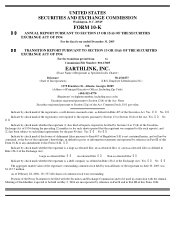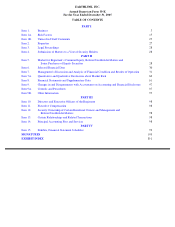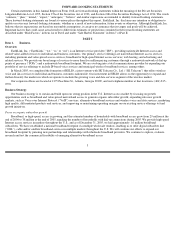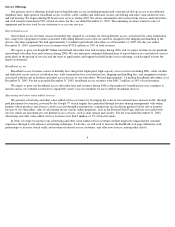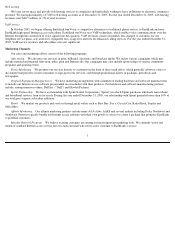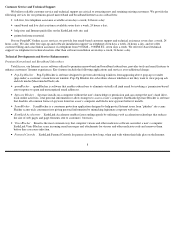Earthlink 2005 Annual Report Download - page 11
Download and view the complete annual report
Please find page 11 of the 2005 Earthlink annual report below. You can navigate through the pages in the report by either clicking on the pages listed below, or by using the keyword search tool below to find specific information within the annual report.
Regulatory Environment
Overview
The regulatory environment relating to our business and operations is evolving. A number of legislative and regulatory proposals under
consideration by federal, state and local governmental entities may lead to the repeal, modification or introduction of laws or regulations which
do or could affect our business. Significant areas of regulation for our business include general telecommunications industry regulation,
broadband regulation and Internet taxation.
Telecommunications Regulation
ISPs. Neither the Federal Communications Commission (“FCC”) nor any other governmental agency directly regulates ISPs, which are
classified as providers of unregulated “information services” rather than regulated “telecommunications services” under the Communications
Act. Accordingly, most regulations which apply to telephone companies and other common carriers do not apply to us. For example, we are not
currently required to contribute a percentage of gross revenues from our Internet access services to universal service funds used to support local
telephone service and advanced telecommunications services for schools, libraries and rural health care facilities. However, we are permitted to
bill our customers to recover universal service fees passed through to us by our telecommunications vendors.
The classification of Internet access services as “information services” generally precludes states from regulating ISPs as
telecommunications carriers or imposing similar subsidy obligations. While some state commissions may continue to review potential
regulation of these services, and their legal authority and ability to do so is unlikely, Internet-related regulatory policies are continuing to
develop, and it is possible that we could be subject to regulation in the future.
We could also be affected by any change in the ability of customers to reach our network through dial-up telephone connections without
any additional charges. The FCC has ruled that ISPs are not subject to payment of interstate interexchange access charges that apply to
telecommunications carriers that use the local network. Local telephone companies typically assess charges on long distance companies for the
use of the local telephone network to originate and terminate long distance calls, generally on a per-minute basis. Were there to be a regulatory
change that would result in the imposition of access charges, it would adversely affect us because this would substantially increase our cost of
providing ISP services.
VoIP.
The current regulatory environment for VoIP services is still unclear. Traditional telephone service historically has been subject to
extensive federal and state regulation, while Internet services generally have been subject to less regulation. Because some elements of VoIP
resemble the services provided by traditional telephone companies and others resemble the services provided by ISPs, the VoIP industry has
not fit easily within the existing framework of telecommunications law and until recently has developed in an environment largely free from
regulation. The FCC has not yet ruled on whether VoIP services are “telecommunications services” or “information services.”
A determination
that the services constitute “telecommunications services” could adversely affect us if the ruling results in additional regulation. The FCC has
already ruled that VoIP services are exclusively interstate and has barred the states from regulation. The FCC’s interstate ruling has been
appealed in federal appellate court, and if the FCC’s decision were reversed or remanded, it could adversely affect the provision of VoIP
services by allowing state regulation.
The FCC has also begun to assert regulatory authority over VoIP providers and is continuing to evaluate how VoIP will be regulated in
the future. In addition, while some of the existing regulation concerning VoIP is applicable to the entire industry, some rulings are limited to
individual companies or categories of service. As a result, both the application of existing rules to us and our competitors and the effects of
future regulatory developments are uncertain.
Our VoIP services are not currently subject to all of the same regulations that apply to traditional telephone services. It is possible that
Congress and state legislatures, as well as the FCC, will seek to
10


